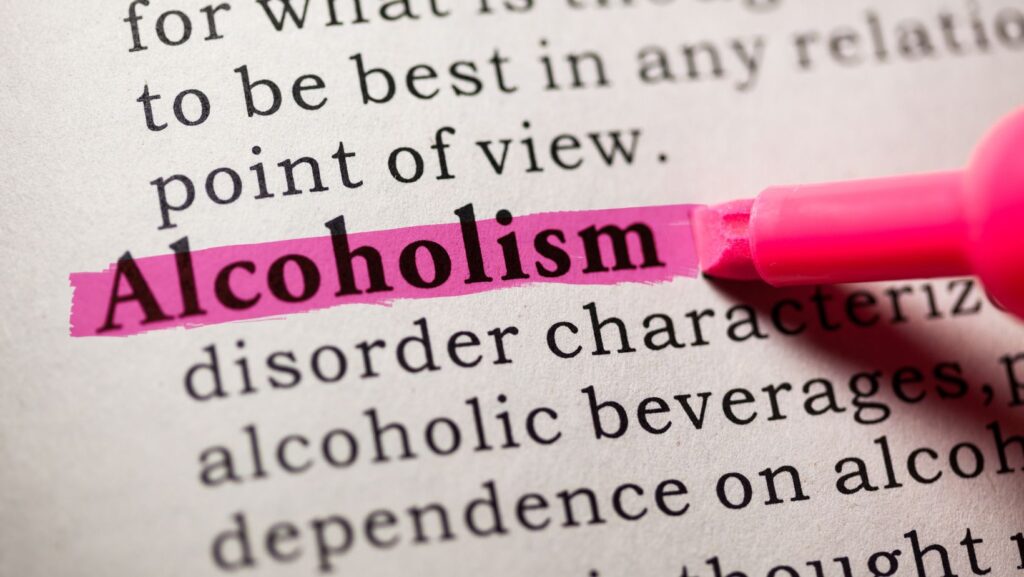Alcohol Use Disorder (AUD), commonly referred to as alcoholism, is a chronic condition defined by the inability to regulate or stop drinking, even when it causes significant harm to daily life. Recognizing the signs of alcoholism is the first step toward seeking help. Common signs of a drinking problem include:
- Drinking alcohol in larger amounts or over a longer period than intended.
- Craving alcohol.
- Developing a tolerance, requiring more alcohol to achieve the same effects.
- Suffering from withdrawal symptoms when not drinking.
- Neglecting responsibilities at work, home, or school due to drinking behavior.
- Engaging in risky behaviors while under the influence, such as driving or unsafe sexual activity.
If these signs resonate, it’s essential to seek support from a health care provider or alcohol counselors to address the problem before it worsens.
Understanding Alcohol Use Disorder
Alcohol use disorder is a medical condition formally recognized in the Diagnostic and Statistical Manual of Mental Disorders (DSM-5). It encompasses a spectrum of problematic drinking habits, ranging from mild to severe.
People with AUD often struggle with an impaired ability to control their alcohol consumption, even when facing health problems or damage to relationships. Heavy drinking and frequent binge episodes, defined as consuming five or more drinks for men or four or more for women in about two hours, poses a significantly increased risk of developing AUD. Family history of substance abuse or mental disorders also raises susceptibility.
The Impact of Alcohol Abuse on Health and Well-Being
Alcohol abuse can lead to serious health conditions and mental health disorders. Prolonged alcohol consumption contributes to physical health problems such as liver disease, heart disease, and weakened immune function. Additionally, it can exacerbate existing mental health issues like depression, anxiety, or other mental health disorders.
Alcohol abuse can also impair decision-making and emotional regulation, causing strain in personal relationships and professional settings. Drinking alcohol excessively often overlaps with drug abuse, further complicating treatment options and recovery efforts.
Navigating Withdrawal Symptoms
Withdrawal symptoms occur when someone who has been drinking heavily or consistently stops drinking altogether. These symptoms can range from mild to severe and often require medical care. Common symptoms include:
- Tremors and shaking.
- Sweating and increased heart rate.
- Nausea and vomiting.
- Insomnia or sleep disturbances.
- Seizures or hallucinations in severe cases.
Seeking medical assistance for alcohol withdrawal is crucial. Health care providers may prescribe certain medications to ease symptoms and monitor for complications like delirium tremens, a life-threatening condition.
Exploring Alcohol Treatment Options
Effective alcohol treatment involves a comprehensive approach tailored to the individual’s needs, at a Massachusetts drug rehab center. Treatment options include:
Medical Detoxification
For individuals experiencing severe withdrawal symptoms, medical detox in a treatment center is often the best course. This process ensures safety during the initial stages of sobriety.
Behavioral Therapy
Behavioral treatments, such as cognitive-behavioral therapy (CBT), address the psychological aspects of alcohol addiction by helping individuals recognize and change unhealthy drinking behavior. Talk therapy and one-on-one sessions with alcohol counselors can also aid recovery.
Family Therapy
Family members often play a crucial role in the recovery process. Family therapy helps rebuild trust, improve communication, and address any emotional support gaps caused by alcohol-related problems.
Group Therapy and Support Groups
Group therapy and support groups like Alcoholics Anonymous (AA) or SMART Recovery provide a supportive community for individuals to share experiences and coping strategies. Social workers and group facilitators guide discussions to foster healthy habits and prevent relapse.
Medication-Assisted Treatment (MAT)
Certain medications, such as naltrexone or acamprosate, can reduce alcohol cravings and the risk of relapse. Combined with behavioral treatment, MAT is an effective strategy for achieving and maintaining sobriety.
Building a Treatment Plan for Alcohol Use
Creating a personalized treatment plan is essential for addressing problem drinking. Health care providers and addiction specialists assess the severity of alcohol addiction, mental health issues, and any co-occurring medical conditions. A comprehensive plan may include:
- Brief intervention sessions to discuss drinking habits and set goals for change.
- Detox and withdrawal management.
- Long-term therapy, such as behavioral therapy or talk therapy.
- Participation in aftercare programs for continued support.
The Role of Support Networks in Recovery
Recovery is a lifelong process that benefits greatly from a strong support network. Family members, friends, and support groups can provide emotional support and accountability during challenging times. Involving loved ones in the treatment process helps reduce feelings of isolation and encourages lasting change.
Aftercare programs, including alumni groups and ongoing counseling, are critical for maintaining sobriety. These programs often include relapse prevention strategies, coping mechanisms for managing stress, and regular check-ins with care providers.
Strategies to Stop Drinking and Maintain Sobriety
For individuals committed to stopping drinking altogether, several strategies can help:
Setting Realistic Goals
Break down the decision to quit drinking into manageable steps. Start with small milestones, such as reducing alcohol use or avoiding certain social situations that involve alcohol.
Adopting Healthy Habits
Replace heavy drinking with healthier activities, such as exercise, meditation, or hobbies. These activities promote physical and mental well-being while serving as alternatives to problem drinking.
Managing Stress Effectively
Many people turn to alcohol as a way of coping with stress. Developing alternative coping strategies, such as journaling, yoga, or seeking support from a therapist, can reduce the urge to drink.
Seeking Professional Support
A health care provider can recommend appropriate treatments, including medications or therapy, tailored to individual needs. Behavioral treatment and counseling are especially effective in addressing the root causes of alcohol addiction.
Joining Support Groups
Support groups like Alcoholics Anonymous offer a sense of community and shared purpose. Members often find motivation and guidance through the experiences of others facing similar challenges.
Overcoming Challenges in Treatment for Alcohol Use Disorder
While treatment for alcohol addiction is highly effective, challenges such as cravings, social pressure, and mental health issues can arise. Addressing these obstacles requires a proactive approach:
1.) Recognizing Alcohol Cravings
Understanding the triggers that cause alcohol cravings can help prevent relapse. Common triggers include stress, certain social situations, or emotional distress. Behavioral therapy can teach strategies to manage these triggers.
2.) Balancing Everyday Life
Returning to everyday life after receiving treatment may feel overwhelming. Developing a structured routine, building a supportive social network, and practicing self-care are essential steps for a successful transition.
3.) Addressing Co-Occurring Disorders
Many individuals with alcohol addiction also face other mental health disorders, such as depression or anxiety. Integrated treatment plans that address both alcohol use and mental disorders are crucial for long-term recovery.
4.) The Importance of Emotional Support and Aftercare
Recovery doesn’t end with completing a treatment program. Emotional support from family members, friends, and professionals plays a significant role in preventing relapse and promoting well-being. Participating in aftercare programs and continuing therapy ensures individuals remain on track in their journey to stop drinking.
Finding the Right Alcohol Use Disorder Treatment Center
Selecting a treatment center that aligns with individual needs is vital for success. Factors to consider include:
- Availability of various treatment options, such as detox, group therapy, or family therapy.
- Comprehensive care that addresses medical conditions and mental health issues.
- Support for financial stress, including assistance with health insurance coverage.
- Focus on holistic approaches, such as mindfulness practices and healthy habits.
Recognize the Signs and Get Help for Alcohol Problems
Alcohol addiction is a challenging but treatable condition. With the right combination of medical care, therapy, and support, individuals can overcome alcohol-related problems and lead fulfilling lives. Whether seeking help through a treatment center, joining support groups like Alcoholics Anonymous, or working with health care providers, there is hope for recovery. If you or someone you know is struggling with alcohol use, take the first step today by reaching out to a care provider or addiction specialist. Together, lasting change is possible.




